Why Students Should Review Prior Knowledge in Math Daily
 by Barbara R. Blackburn
by Barbara R. Blackburn
Content-based "prior knowledge" is the knowledge base students bring to a lesson or specific topic under study. Do they know enough to motion forward?
Information technology's an critical question — we can't back up rigorous learning unless we brand sure students are set for the experience. So it'southward important to determine what a pupil really understands about a concept as nosotros set up for new education.
Let's look at iii strategies teachers are using to check for and assist students tap into prior knowledge: Anticipatory Guides, KWL+H, and the LINK small/whole group technique.
Using an Anticipatory Guide
Pat Vining, an 8th form math teacher, uses a simple activity to check her students' prior knowledge of the concept and to articulate up any misunderstandings students may have nearly the topic. First, she gives students three minutes to answer a brusk true/faux questionnaire.
Next, in pairs, students compare responses and utilise the textbook to bank check their answers. Each set of partners must rewrite whatever false statements and so that they are true. She ends with a whole-class discussion to ensure understanding.
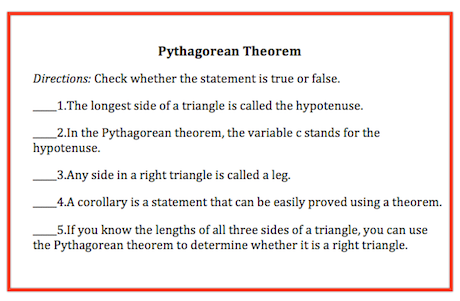
Using K-W-L + H
Probably the most mutual method of identifying students' prior noesis that I see in classrooms today is a KWL chart.
During a KWL activity, teachers typically ask the students what they already know about a topic (K) or what they think they know virtually it. Next, y'all enquire what they desire to know (Due west). Then, y'all teach the lesson and ask them what they learned (L).
What I found equally a teacher was that students had more buying in the lesson when I also asked them (H) – How tin nosotros learn this?
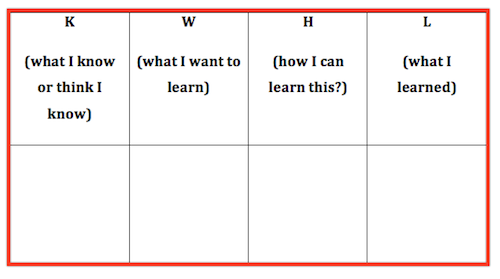
Using the LINK Strategy
Kendra Alston, a former middle school teacher, adapted the KWL strategy into a LINK for her students. Information technology works in just about whatsoever content area.
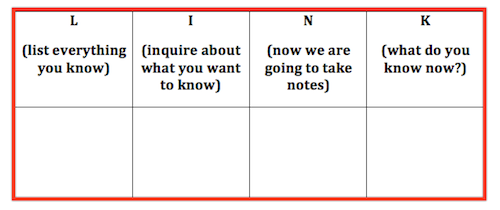
Afterwards they complete the 50 column individually, Kendra's students turn to a partner and share their answers. And so she leads a brusk class give-and-take, charting out what everyone in the class knows near the topic.
As she works through the lesson, students terminate past writing what they now know (K), and they tear that office off to turn in every bit they leave her class. This provides her immediate feedback about what her students learned or didn't learn in class.
The key stride: It's important to share students' responses with everyone, albeit information technology in a safe style that doesn't embarrass them. That's why I like her method. She starts past assuasive each educatee to write an private response, then everyone has an opportunity to recall almost what they know.
As Kendra points out: "If I'm a student, by sharing with a partner, I tin feel 'safer' in case I'g not right. In the whole class discussion, I'chiliad sharing 'our' answers (mine and my partner'south), so I don't experience like I'yard out on a limb past myself. You could even add together another option of sharing with two groups of partners before y'all share with everyone. "
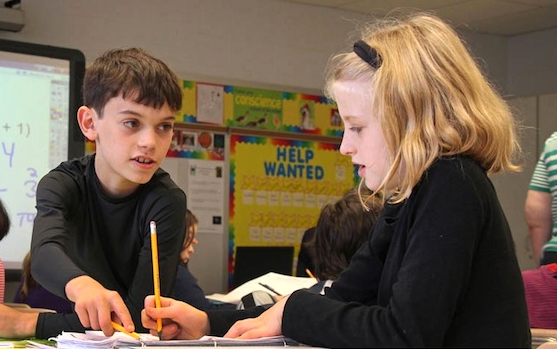
Withal, Kendra adds, "don't sacrifice the whole class discussion. Nosotros all learn more together, and it'south a rubber judge that someone in my class knows something I don't know. Listening to all responses and charting them out for everyone to see helps me build prior cognition when I don't have much."
When we know what students already understand almost an upcoming lesson, we can teach more rigorously and effectively. These iii strategies are helpful tools to gauge pupil'south knowledge.
Photo: Woodleywonderworks, Flickr CC
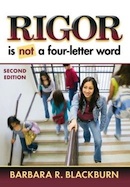 Barbara Blackburn is a best-selling author of 14 books, including Rigor is Non a Iv-Letter of the alphabet Word. A nationally recognized good in the areas of rigor and motivation, she collaborates with schools and districts for professional development. Barbara can be reached through her website or her weblog. She'southward on Twitter @BarbBlackburn. See her other MiddleWeb posts hither.
Barbara Blackburn is a best-selling author of 14 books, including Rigor is Non a Iv-Letter of the alphabet Word. A nationally recognized good in the areas of rigor and motivation, she collaborates with schools and districts for professional development. Barbara can be reached through her website or her weblog. She'southward on Twitter @BarbBlackburn. See her other MiddleWeb posts hither.
Source: https://www.middleweb.com/14986/3-ways-to-check-prior-knowledge/
Postar um comentário for "Why Students Should Review Prior Knowledge in Math Daily"